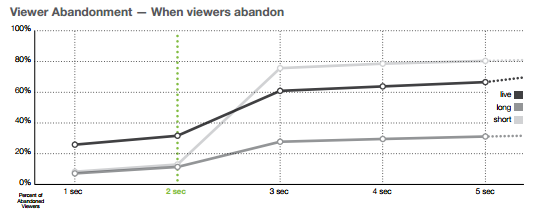Businesses want to reach their customers online, but the fragmented market forces professionals to optimize media for a variety of devices. This fact rings especially true for video marketing initiatives, as On Device Research discovered that 92 percent of mobile video content viewers share links with their personal networks. At first glance, this data might compel marketing departments to focus their content creation efforts on mobile technology, but new data from Conviva shows more mobile playback issues than on PCs. In addition, brands must be wary of live-streaming opportunities as these types of visual media have high levels of abandonment. Below we break down the data to guide your video marketing success.
Stick to pre-recorded content in this fast-paced world.
Conviva’s “Viewer Experience Report” shares data that may mean content length and device type can affect video completion rates. More, viewership fluctuates between recorded and live-streamed content. For example, live-streamed videos often take longer to load than other forms of content, which drives prospects to abandon their actions and navigate away from branded content. According to the report, live video sees an abandon rate of 18 percent, compared to short-form video’s 6 percent and long-form’s 4 percent.
 While the draw of live-streaming video campaigns can make the reward more attractive than the risk, brands should only turn to this option when they have established a video presence, and can afford to experiment with trial and error tactics. Beginners beware.
While the draw of live-streaming video campaigns can make the reward more attractive than the risk, brands should only turn to this option when they have established a video presence, and can afford to experiment with trial and error tactics. Beginners beware.
Mobile as a bonus, not as a strategy
When it comes to devices, 55 percent of online video content views on iOS devices and 49 percent of Android video streams had problems with buffering. In comparison, just thirty-six percent of PCs using flash had trouble streaming visual media. Buffering issues can turn potential impressions away, and unsuccessful video starts can leave sour tastes in internet users’ mouths. The study showed that 17.5 percent of videos never started on Android devices, and 14 percent never loaded properly on iOS devices. Start issues dropped to 11 percent when on PCs.
Mobile can bolster views and, as people share content, media can have a wider reach. However, brands should look at mobile as a bonus, not as a strategy. This means optimize video to be accessible on iOS and Android devices, but focus more attention on making sure content loads quickly, and PCs currently offer the most reliable video experience.




